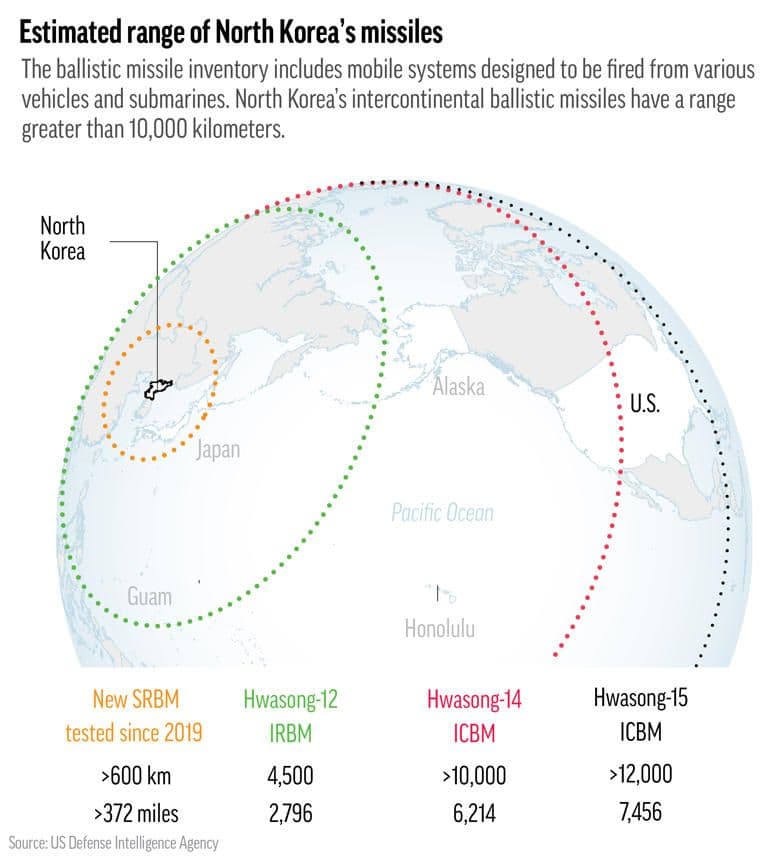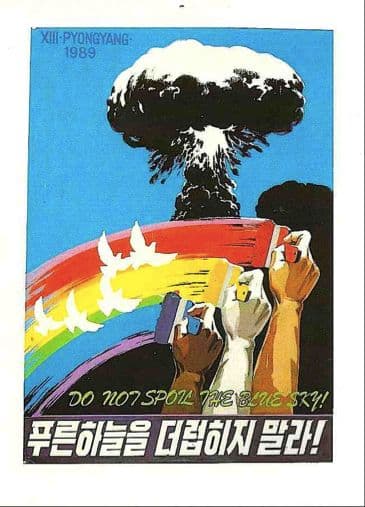Missile Test
Launch. On Tuesday, North Korea fired a ballistic missile without warning over Japan, an escalation in their weapon testing program. The missile traveled over northern Japan early in the morning and is believed to have landed in the Pacific Ocean. This is North Korea’s 23rd missile launch this year; however, the last time North Korea fired a ballistic missile over Japan was in 2017. This launch marks the most ballistic missiles fired in a single year since leader Kim Jong-un took power in 2012.
Threat. Missile tests are considered a provocative move since it demonstrates to other nations the distance with which an explosive can be delivered. Launching a missile over the northern part of Japan demonstrates that North Korea is capable of striking any part of the island nation — potentially with a nuclear strike. North Korea is attempting to show force with this missile test as a deterrent — with the idea that Japan will be less likely to intervene should North Korea invade their southern counterpart.

Response. Following the test on Tuesday, Moon Hong Sik — acting spokesperson at the South Korean Defense Ministry — described North Korean nuclear threats as “very grave and serious.” However, he also mentioned South Korea’s military is capable of detecting and intercepting the variety of missiles North Korea launched in a barrage of recent simulated nuclear attacks. Yet, the North Korean advancement of its nuclear capabilities presents a serious security threat that South Korean forces may find difficult responding to. Experts have said a portion of the North’s newly developed weapons — such as a highly maneuverable KN-23 missile — may overcome South Korean and U.S. defenses. They also say if North Korea launches multiple missiles from different sites simultaneously, it would be increasingly difficult to spot liftoffs in advance and shoot them down.
Nuclear Threat
Past Attempts. During the Cold War, North Korea and the Soviet Union signed a cooperation agreement where the Soviet Union would provide basic nuclear training and technology to Korea. The agreement spawned plans for a nuclear facility near Yongbyon that later became a flashpoint when discovered by the United States. Using satellite images, the United States obtained conclusive evidence that North Korea had a nuclear weapons program in 1989. In 2006, North Korea began underground tests of nuclear weapons – only discovered by seismic readings. Now, as many believe North Korea possesses nuclear capabilities, they are testing their delivery system in the form of ICBM rockets.

Russian Influence. At a fundraiser in New York City, President Biden said for the “first time since the Cuban missile crisis, we have the direct threat of the use of a nuclear weapon if in fact things continue down the path that they are going. That’s a different deal.” President Joe Biden issued a dire warning about the escalating nuclear dilemma in Russia Thursday night, saying the country's president, Vladimir Putin, is "not joking" when he talks about potentially using the weapons. Kim Jong-un is well aware of the effectiveness of the threat of nuclear force. Should countries actually engage in a joint defense of South Korea, Kim Jong-un will leverage his nuclear capabilities to prevent foreign interference in a possible invasion.
Human Rights. North Korea is the most isolated and isolationist country in the world. Almost every citizen of North Korea is indoctrinated into the nation’s ideology ruled by its dictator Kim Jong-un. As of today, there are three main ways to access outside information in North Korea: radio; electronic devices like USB drives, DVDs, CDs; and cell phones. Emerging technology presents opportunities to disseminate information in new ways that may improve information access in the DPRK to provide information about the tyranny of their government. However, the threat of nuclear war could present a difficult deterrent to more aggressive information campaigns. North Korea has been known for cyber threats to foreign companies like Sony Entertainment. Under the threat of nuclear war, it may make humanitarian efforts and counter-espionage impossible.







